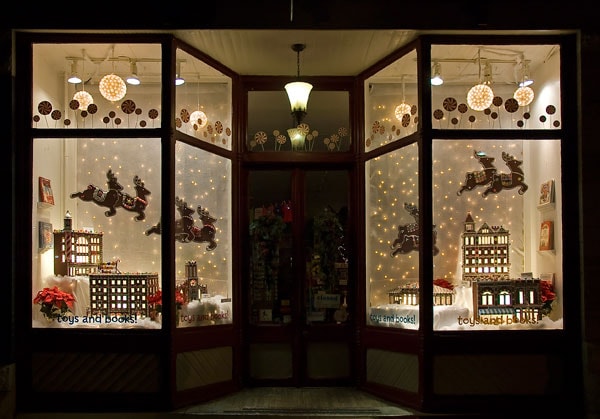
How To Create the Best Retail Product Display for the Holidays
By Chris Caesar (originally published on Salsify)
NOVEMBER 22, 2022 | 9 mins read
While James Edgar might not be a household name today, his efforts played a major role in ensuring a certain white-bearded, jolly fellow became one. Edgar was a nineteenth-century Scottish immigrant who ran a successful dry goods store in Brockton, Massachusetts, with a penchant for innovative marketing spectacles — at least by the standards of his time.
The entrepreneur offered customers generous coupons, eye-catching retail product displays, and — in a particularly inspired move — even once threw pennies off the roof of his store to passersby below.
However, his most influential stroke of genius came in 1890, when after years of dressing as a clown to entertain shopping families during the holidays, he instead opted for a Santa Claus costume. In doing so, he’s believed to have become the first department store Santa Claus in history, as noted by the New England Historical Society.
Retail Product Displays: Everything Started With Santa
Edgar became a sensation in a matter of days, with children and their parents later coming from as far as Boston; Providence, R.I.; and New York for the opportunity to meet Santa Claus. Within a decade, nearly every department store in the U.S. adopted the idea. Like many holiday memories, the impact of Edgar’s performance was emotive, surreal, and something many of his customers would remember — and talk about — for the rest of their lives.
“You just can’t imagine what it was like,” a man in his 90s, who met Edgar’s Santa Claus as a young boy, told a magazine in 1976 (per the New England Historical Society). “I remember walking down an aisle and, all of a sudden, I saw Santa Claus. I couldn’t believe my eyes, and then Santa came up and started talking to me … It was a dream come true.”
As brick-and-mortar sales are on the rise this year, as noted by Forbes, it’s likely that this holiday season will see another uptick in in-person shopping habits.
Marketers today are well-acquainted with the opportunities the season presents for brands and retailers — so how can they create retail product displays with that same kind of “James Edgar magic” in the much flashier twenty-first century?
Below, you’ll find best practices — along with some strong examples of companies putting some “magical” methods into practice.
3 Next-Generation Approaches for Your Retail Product Display
While mobile phones and computers tend to be consumers’ main points of focus as they proceed along their journey to purchase, it’s important to remember that in-store experiences can play an equally important role in your omnichannel marketing strategy, driving both awareness and conversion.
Here are three new ways to integrate your digital touch points with your physical ones in ways your customers will find both refreshingly consistent and engaging.
1. Embrace QR Codes
Once broadly dismissed as gimmicky and clunky, QR codes have now gone mainstream after some major improvements in user experience — and customers find them more intuitive than ever.
As you probably know, QR codes are visual barcodes that direct users to URLs. However, this provides a great deal of room for creativity, personalization, and localization for your shoppers and allows you to incorporate customer data into their in-person experience.
For example, clicks can provide automated, relevant information like in-store product recommendations based on previous searches, a loyalty reward or coupon, the ability to buy products from home later, and more.
2. Incorporate In-Store Tablets
Retailers can also incorporate their own in-store tablets into holiday displays rather than relying on customers to employ their own mobile devices. Having shoppers log in with their information can be a great way to incorporate data you’ve collected along their journey into their in-store experience.
Tablets are also a great way to provide rich, multimedia points of information to customers and capture their attention over competing displays — they can expertly address a wide range of customer inquiries without needing a salesperson immediately available.
3. Dip Your Toes Into Augmented Reality
Augmented reality (AR) is one of the hottest buzzwords in consumer marketing today, and for good reason. Many brands and retailers have created some amazing experiences for their shoppers with this emerging tech.
In contrast to virtual reality (VR), which creates an entirely constructed three-dimensional world for the user, AR instead creates an overlay of the user’s view of existing reality — typically by adding text, images, and other multimedia onto your mobile phone’s camera view.
The possibilities here are endless, with retailers and brands employing intriguing technology like holograms, secret messages, virtual scavenger hunts, and more in their retail product displays.
One last point of note: While the technology initially went mainstream thanks to video game fans — specifically, Pokémon GO players — consumers now report that the number one reason they use AR technology today is to shop, according to a 2021 study noted by Adweek.
Notable Holiday Retail Product Displays
Here are two examples of retailers that are leveraging new technologies to create engaging retail product displays for the holidays.
Harrods Experiments With AR Window Displays
Harrods Limited is a luxury department store in London well-known for its iconic holiday window displays each year. In 2021, however, the retailer decided to take an adventurous approach, incorporating an AR animation into its presentation.
Creators of Visualise said they were tasked with designing a display that would incorporate traditional elements of Christmas while adding an unexpected twist at the end.
Customers had to simply scan a QR code and lift their phones to watch this combination of traditional and contemporary Christmas cheer — a fun, memorable take on the classic holiday retail product display.
Video Source: Visualise YouTube
Westfield Shopping Centres Sends Families on an AR Scavenger Hunt
If you’re going to be walking around a busy mall, why not make a game of it?
As noted by VRScout, Westfield Group, owner of shopping centers around the world, became the first mall chain to offer customers an AR scavenger hunt throughout their locations for the holiday season. The game encouraged shoppers to uncover 10 virtual holiday-themed characters like gingerbread people, a snowman, Santa, and more.
Those who found all 10 characters qualified for promotions they could redeem at nearby stores.
Upon discovery, participants could also opt to take family photos or selfies with the holiday characters — a great way to encourage shoppers to spread awareness of the promotion and shopping center on their own social media channels.

Image Source: Globe Newswire
Keeping the ‘Wow’ in Holiday Shopping Experiences
Is James Edgar’s brand of marketing magic still viable in an age of ecommerce, omnichannel marketing, and large corporate box stores? While there was a bit more competition for consumer attention in the early twenty-first century than in 1890, there are still all sorts of ways that brands and retailers can create holiday experiences that resonate with in-person shoppers.
Remember: As brick-and-mortar sales continue to grow, so does your opportunity to cash in on that returning end-of-year foot traffic. Physical stores are more popular than they were a year ago — not just as a point of purchase but as a source of inspiration for other future purchases.
Make sure you take full advantage of the coming holiday cheer this season.
It’s about that time of year again for ecommerce professionals: Check out Salsify’s “2022 Holiday Shopping Trend Report” for expert insights on consumer trends and other emerging opportunities this upcoming holiday season.



